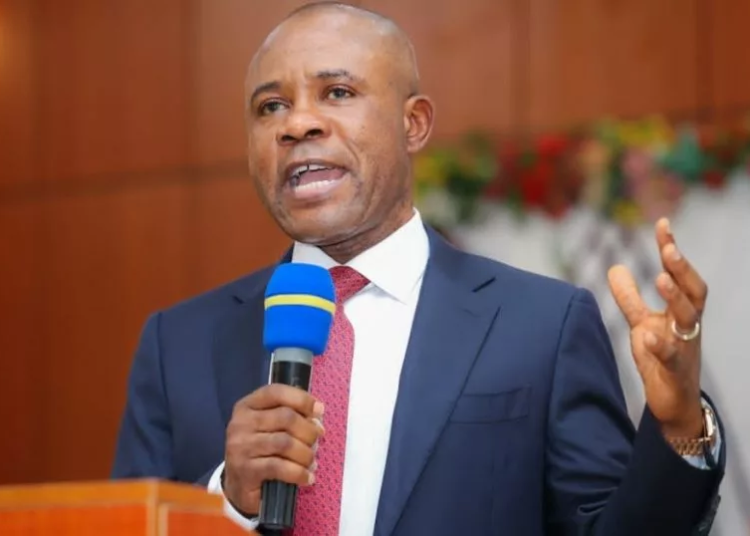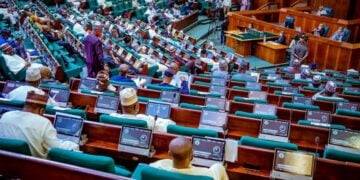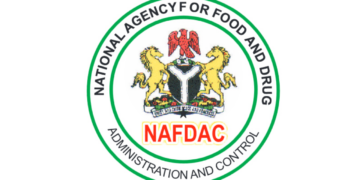Enugu State Governor, Peter Mbah, has advocated deliberate reforms to strengthen access to finance for small and medium-scale enterprises (SMEs) and ensure Nigeria benefits from the ECOWAS Trade Liberalisation Scheme (ETLS).
He described the initiative as a significant opportunity to expand trade across the West African region.
Represented by his deputy, Barr. Ifeanyi Ossai spoke at a one-day sensitisation workshop on the ETLS, themed “Increasing Intra-Regional Trade through ETLS”, held on Monday at the International Conference Centre (ICC), Enugu.
He commended the Federal Ministry of Foreign Affairs and ECOWAS National Unit for choosing Enugu as the venue, noting that the Southeast region, known for its strong trading culture and entrepreneurial drive, stood to gain immensely from the scheme.
“You know we’re traders, and when you talk about SMEs in Nigeria, you can’t discount the Southeast because that’s what we’re known for,” Ossai said. “The ETLS presents an opportunity to expand trade not just for us but also for other countries within our region.”
However, he cautioned that while regional integration offered new trade opportunities, lessons from the past must not be ignored.
“There are critics who view globalisation as suffocating local production. They’re not entirely wrong. We once had Peugeot in Kaduna, Michelin in Port Harcourt and Lagos, and Aba was known for some of the best shoes. Sadly, all those have disappeared,” he said.
The Deputy Governor urged the Federal Government to establish frameworks to protect local manufacturers while implementing regional and global trade agreements.
He also called for the decentralisation of approval powers in development finance institutions such as the Bank of Industry, Bank of Agriculture, and NEXIM Bank, to enable quicker access to funding for entrepreneurs.
“For an SME trader in Ogbete Market or Coal Camp seeking finance, applications shouldn’t have to wait for approval from Abuja,” he said. “Government must restructure policies to empower regional offices to approve facilities for viable businesses. Development finance should be based on business potential, not collateral.”
Ossai also proposed the creation of an ECOWAS Commercial Bank to support regional infrastructure and SMEs. “Manufacturing and production cannot thrive without robust infrastructure. ECOWAS must begin to tinker with a commercial bank that finances governments and supports SMEs,” he added.
In her opening remarks, Minister of State for Foreign Affairs Ambassador Bianca Odumegwu-Ojukwu described the workshop as vital to deepening regional integration and empowering small businesses to take advantage of West Africa’s growing market.
“The ETLS is not just a technical instrument but a strategic pillar of West Africa’s integration agenda,” she said. “It underpins free movement of goods and services and complements the African Continental Free Trade Area (AfCFTA).”
Odumegwu-Ojukwu said Nigeria’s leadership in regional trade must translate into opportunities for local entrepreneurs.
“Success lies not in Abuja or Lagos, but in how effectively our traders, manufacturers, and innovators can compete regionally. This workshop is about democratizing opportunity,” she noted.
She praised Enugu’s leadership in fostering innovation and enterprise, describing the state as “a model for how local dynamism can align with continental ambitions.”
Also speaking, the Director, ECOWAS National Unit, Ministry of Foreign Affairs, Ambassador Olawale Emmanuel Awe, made the call on Tuesday in Enugu during a one-day sensitisation workshop on the scheme, organised to enlighten Micro, Small, and Medium Enterprises (MSMEs) in the region on the theme of “Increasing intraregional trade through ETLS.”
Awe disclosed that the ETLS was designed to promote economic integration among member states by allowing goods produced within any ECOWAS country to be traded freely within the sub-region without payment of customs duties.
“The ETLS is primarily made for business people, particularly MSMEs, big entrepreneurs, and petty traders who have products that can be sold within the West African region,” Awe said. “Once registered under the scheme, Nigerian manufacturers can export their products to the 12 ECOWAS countries without paying customs duties.”
He explained that the scheme, one of the protocols underpinning ECOWAS’ founding vision in 1975, aims to achieve the free movement of goods and services and foster regional prosperity through economic integration.
Awe emphasised that businesses must complete the required registration process to benefit from the initiative.
“Any businessperson manufacturing in Nigeria must first register with us. They will need to submit samples of their products, after which the National Approval Committee—comprising the Ministries of Foreign Affairs, Trade, SON, NAFDAC, Customs, MAN Export Group, and NEPC—will conduct factory inspections to confirm that the products are genuinely made in Nigeria,” he said.
He warned that the scheme does not permit the re-export of foreign goods, adding, “We don’t want a situation where someone imports from China and re-exports. Only products made in Nigeria are eligible. ”
Awe noted that the sensitisation workshop was necessary because many business owners in the South East were still unaware of the scheme’s benefits despite the region’s thriving entrepreneurial base.
“We are doing this to enlighten our businessmen to leverage this opportunity and earn more profit. Once you don’t pay customs charges, you are as good as selling within Nigeria,” he said.





